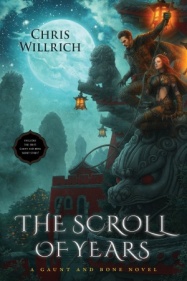270 pages, Pyr
Paperback, $15.95, Kindle $8.69
ISBN 978-1616148133
Some people take being partners in crime to a whole new level, and Persimmon Gaunt and Imago Bone are “those” people. Gaunt is a bard. Well, she’s a poet (close enough) who craved adventure and was fascinated by the undead from a very young age (ye olde goth girl). Bone is a twice-cursed thief who is entering his nineties, but who appears to be young and spry—his body hasn’t aged in seventy years. Their natures and their jobs have taken them all over to places that polite people don’t talk about in public or even mention when they think people are not listening. They have beaten the odds and defied all laws of probability. And now this couple has decided to retreat to the middle of nowhere to settle in and have a family. Their plans would be great if they were not being hunted by two of the most effective and feared assassins in this world.
This was my first encounter with Gaunt and Bone, and I was impressed. If the book description sounds complicated, then you are right: It is. While it is complicated, it’s not too complex to follow—most of the time. This book starts with second-story work, traps, and angry guardian creatures. It’s kind of hard to go wrong with a beginning like that.
Bone is what I’d call the quintessential thief. Though he’s a little too Robin Hood for my tastes, this guy loves to steal. In truth, “loves” is almost not a powerful enough word—stealing is part of his soul. He thrives on the challenge of stealing; he has morals in a way that only a thief can have. I enjoyed that Willrich had Bone always think of the heist first in any situation he entered. To me, this was the biggest indicator of just how dedicated he is to his craft.
Gaunt, is the poetic counterpart to Bone. She deals in words like Bone deals in stolen goods, and she sees the words in terms of stories and poems. Based on this novel, I suspect that Willrich is as much of a poet as he is an author. I normally pan authors who try to use big descriptive words to prove how skilled they are at wordcraft rather than just writing good stories. This book was different: Willrich was canny, and he included all those flowery words and phrases, but included them in poems and stories written by Gaunt. Willrich is actually a good poet, and, in the tradition of Tolkien, he actually writes the poem. Well played, sir, well played.
I was surprised at the twists and turns this novel takes. I was not expecting the cultural angle that the author took, and I really enjoyed it. Willrich really captured the cadence of the culture and language of what I think a fantasy Eastern culture should be. Willrich even did due diligence when it came to his Western characters learning the Eastern language. They spoke a pidgin version of it for most of the novel and seemed to really get the hang of it toward the end, but were never 100 percent skilled in it. A part of the book showed how one of the literate bandits was teaching her counterpart how to write, and the description of the overall concept of writing was really unique—for a brief moment I felt like I understood how to approach writing the types of characters Willrich describes.
There were a few times during the course of this book where I got lost or where the events seemed a bit disjointed. Several times, characters go back and forth between dimensions, and, as jarring as I guess something like this would be, I still felt like some more detailed descriptions could have eased the reader’s confusion. These moments were by no means a reason to pass this book up, though.
Bone and Gaunt are really interesting characters. One of their early exploits is included in the novel, which was really nice, but I do wonder if the story might have been even better if this element was placed at the beginning of the book. Having said that, I do understand why Willrich placed it at the end.
No Bone about it, this is a good book.


Thanks for the heads up. I’ll be adding this to my to-read list.